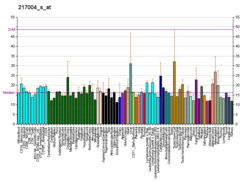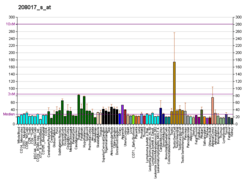MCF2
Proto-oncogene DBL is a protein that in humans is encoded by the MCF2 gene.[5][6][7]
MCF2 is a member of a large family of GDP-GTP exchange factors that modulate the activity of small GTPases of the Rho family. Five-prime recombinations result in the loss of N-terminal codons, producing MCF2 variants with oncogenic potential.[supplied by OMIM][7]
References
- 1 2 3 GRCh38: Ensembl release 89: ENSG00000101977 - Ensembl, May 2017
- 1 2 3 GRCm38: Ensembl release 89: ENSMUSG00000031139 - Ensembl, May 2017
- ↑ "Human PubMed Reference:".
- ↑ "Mouse PubMed Reference:".
- ↑ Noguchi T, Galland F, Batoz M, Mattei MG, Birnbaum D (Apr 1994). "Activation of a mcf.2 oncogene by deletion of amino-terminal coding sequences". Oncogene. 3 (6): 709–15. PMID 2577874.
- ↑ Galland F, Stefanova M, Lafage M, Birnbaum D (Jul 1992). "Localization of the 5' end of the MCF2 oncogene to human chromosome 15q15----q23". Cytogenet Cell Genet. 60 (2): 114–6. PMID 1611909. doi:10.1159/000133316.
- 1 2 "Entrez Gene: MCF2 MCF.2 cell line derived transforming sequence".
Further reading
- Ron D, Zannini M, Lewis M, et al. (1991). "A region of proto-dbl essential for its transforming activity shows sequence similarity to a yeast cell cycle gene, CDC24, and the human breakpoint cluster gene, bcr". New Biol. 3 (4): 372–9. PMID 2065022.
- Tronick SR, McBride OW, Popescu NC, Eva A (1990). "Chromosomal localization of DBL oncogene sequences". Genomics. 5 (3): 546–53. PMID 2613238. doi:10.1016/0888-7543(89)90022-0.
- Ron D, Tronick SR, Aaronson SA, Eva A (1989). "Molecular cloning and characterization of the human dbl proto-oncogene: evidence that its overexpression is sufficient to transform NIH/3T3 cells". EMBO J. 7 (8): 2465–73. PMC 457116
 . PMID 3056717.
. PMID 3056717. - Eva A, Vecchio G, Rao CD, et al. (1988). "The predicted DBL oncogene product defines a distinct class of transforming proteins". Proc. Natl. Acad. Sci. U.S.A. 85 (7): 2061–5. PMC 279928
 . PMID 3281159. doi:10.1073/pnas.85.7.2061.
. PMID 3281159. doi:10.1073/pnas.85.7.2061. - Srivastava SK, Wheelock RH, Aaronson SA, Eva A (1987). "Identification of the protein encoded by the human diffuse B-cell lymphoma (dbl) oncogene". Proc. Natl. Acad. Sci. U.S.A. 83 (23): 8868–72. PMC 387034
 . PMID 3491366. doi:10.1073/pnas.83.23.8868.
. PMID 3491366. doi:10.1073/pnas.83.23.8868. - Hart MJ, Eva A, Zangrilli D, et al. (1994). "Cellular transformation and guanine nucleotide exchange activity are catalyzed by a common domain on the dbl oncogene product". J. Biol. Chem. 269 (1): 62–5. PMID 8276860.
- Nishida K, Kaziro Y, Satoh T (1999). "Association of the proto-oncogene product dbl with G protein betagamma subunits". FEBS Lett. 459 (2): 186–90. PMID 10518015. doi:10.1016/S0014-5793(99)01244-2.
- Kato J, Kaziro Y, Satoh T (2000). "Activation of the guanine nucleotide exchange factor Dbl following ACK1-dependent tyrosine phosphorylation". Biochem. Biophys. Res. Commun. 268 (1): 141–7. PMID 10652228. doi:10.1006/bbrc.2000.2106.
- Zhu K, Debreceni B, Li R, Zheng Y (2000). "Identification of Rho GTPase-dependent sites in the Dbl homology domain of oncogenic Dbl that are required for transformation". J. Biol. Chem. 275 (34): 25993–6001. PMID 10854437. doi:10.1074/jbc.M003780200.
- Palmieri G, de Franciscis V, Casamassimi A, et al. (2000). "Human dbl proto-oncogene in 85 kb of xq26, and determination of the transcription initiation site". Gene. 253 (1): 107–15. PMID 10925207. doi:10.1016/S0378-1119(00)00212-2.
- Jin S, Exton JH (2000). "Activation of RhoA by association of Galpha(13) with Dbl". Biochem. Biophys. Res. Commun. 277 (3): 718–21. PMID 11062019. doi:10.1006/bbrc.2000.3744.
- Zhu K, Debreceni B, Bi F, Zheng Y (2001). "Oligomerization of DH domain is essential for Dbl-induced transformation". Mol. Cell. Biol. 21 (2): 425–37. PMC 86589
 . PMID 11134331. doi:10.1128/MCB.21.2.425-437.2001.
. PMID 11134331. doi:10.1128/MCB.21.2.425-437.2001. - Vanni C, Mancini P, Gao Y, et al. (2002). "Regulation of proto-Dbl by intracellular membrane targeting and protein stability". J. Biol. Chem. 277 (22): 19745–53. PMID 11907027. doi:10.1074/jbc.M111025200.
- Wennerberg K, Ellerbroek SM, Liu RY, et al. (2003). "RhoG signals in parallel with Rac1 and Cdc42". J. Biol. Chem. 277 (49): 47810–7. PMID 12376551. doi:10.1074/jbc.M203816200.
- Komai K, Okayama R, Kitagawa M, et al. (2003). "Alternative splicing variants of the human DBL (MCF-2) proto-oncogene". Biochem. Biophys. Res. Commun. 299 (3): 455–8. PMID 12445822. doi:10.1016/S0006-291X(02)02645-1.
- Komai K, Mukae-Sakairi N, Kitagawa M, Shiozawa S (2003). "Characterization of novel splicing variants of the mouse MCF-2 (DBL) proto-oncogene". Biochem. Biophys. Res. Commun. 309 (4): 906–9. PMID 13679059. doi:10.1016/j.bbrc.2003.08.088.
- Ross MT, Grafham DV, Coffey AJ, et al. (2005). "The DNA sequence of the human X chromosome". Nature. 434 (7031): 325–37. PMC 2665286
 . PMID 15772651. doi:10.1038/nature03440.
. PMID 15772651. doi:10.1038/nature03440. - Kimura K, Wakamatsu A, Suzuki Y, et al. (2006). "Diversification of transcriptional modulation: large-scale identification and characterization of putative alternative promoters of human genes". Genome Res. 16 (1): 55–65. PMC 1356129
 . PMID 16344560. doi:10.1101/gr.4039406.
. PMID 16344560. doi:10.1101/gr.4039406.
This article is issued from
Wikipedia.
The text is licensed under Creative Commons - Attribution - Sharealike.
Additional terms may apply for the media files.





